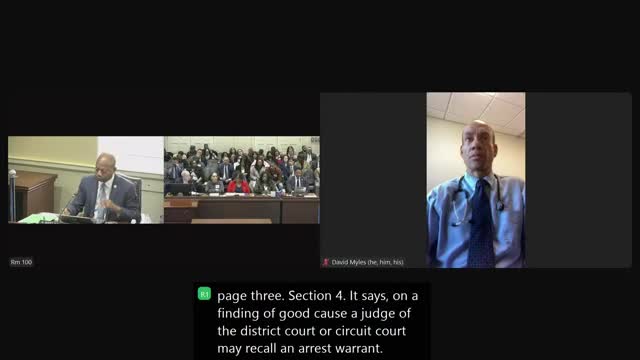State police, prosecutors urge fix to DNA law that left thousands of samples in limbo
Get AI-powered insights, summaries, and transcripts
Subscribe
Summary
Witnesses pressed for House Bill 259, a statutory fix to how arrestee DNA samples are collected, analyzed and expunged. State police and forensic directors said ambiguous "arraignment" language has left more than 16,000 samples untested or not expunged and proposed changes to clarify triggers for testing and expungement.
House Bill 259 would clarify responsibilities and triggers for collection, testing and expungement of DNA samples for arrestees, convicted offenders and certain registrants. Witnesses from Maryland State Police and the Forensic Sciences Division said a legacy requirement in the statute that linked arrestee sample testing to an "arraignment" created a backlog of samples that could neither be analyzed nor expunged.
Tom Williams of the Maryland State Police and Dan Katz, director of the forensic division, told the committee that when the original arrestee DNA law was written, the term "arraignment" created an unreliable trigger for analysis and expungement because in many cases the arrestee never reaches a circuit-court arraignment in the old sense. The practical result, they said, is a backlog of samples collected at arrest that are sitting in evidence labs in limbo; Williams said the number rose from roughly 13,000 last session to more than 16,000.
The bill removes the ambiguous "arraignment" trigger and replaces it with concrete mechanisms used in the Maryland criminal process to establish probable cause for testing and upload to CODIS. It also establishes an expungement pathway for untested arrestee samples and codifies collection of DNA from registered sex offenders at registration.
The state's attorney offices and the attorney general's office supported the bill; witnesses emphasized the public-safety benefits of increasing the pool of analyzed DNA in CODIS, which helps resolve cold cases and link evidence from rape kits to suspects. Supporters also said the bill includes a pathway to expunge existing unresolved samples to protect the rights of arrestees.
Committee members asked about the fiscal note and timing of sample analysis; witnesses said the laboratory has processed many samples but needed the statutory fix to move thousands out of the evidence limbo and that the bill had no major fiscal impact in the department—s testimony.
